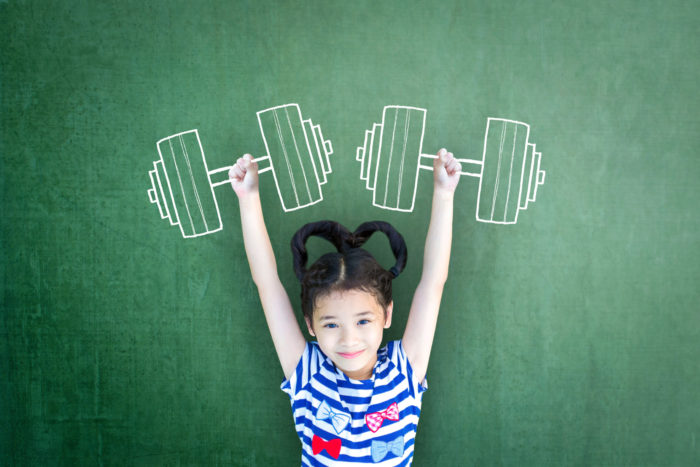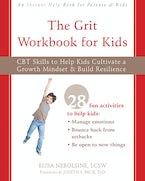Elisa Nebolsine, LCSW, author of The Grit Workbook for Kids
I put on my winter coat for the first time this year and I found a receipt for hand sanitizer in the pocket. As I looked at it, I realized the last time I had worn this coat was at the start of the pandemic, and I couldn’t quite believe it had been a spring, summer, and fall of the virus. As an adult, I felt overwhelmed. As a child therapist, I feel sick for the kids I work with. The emotional and developmental cost to kids has been high.
Kids have basic developmental needs, and these vary by age, but there are some fundamentals that exist across childhood: meaningful connection with family, friends, and community; learning and new experiences; exercise, outdoor time, and play. Our kids are not getting access to all that they need right now.
So, how do we help them? How do we coach, support, and teach them through this time? I’ve been thinking a lot about this of late, and the work of Martin Seligman (founder of the Positive Psychology movement and professor at University of Pennsylvania) feels more relevant than ever. Dr. Seligman’s early research was on learned helplessness—and this experience of seeing how we give up and lose hope—led him to study how to gain hope and learn how to thrive.
Seligman—whose hero was Jonas Salk, inventor of the polio vaccine—set about trying to create a “vaccine” for kids who were at risk of depression. This vaccine was about changing thoughts, specifically those that led to depression, and changing them at a young age. He envisioned working with kids preventively, before the onset of depression, to change mindsets and reduce the risk of depression at later ages.
In the simplest form, we can look at changing thoughts that involve the “3 Ps.” Personal, Permanent and Pervasive.
When kids (or anyone) think everything is personal—that it’s is all about them and all because of them—it leads to more negativity. “I can’t do math; I just can’t get it!” or “They don’t invite me for bike rides because they just don’t like me.” Do you see the personal interpretation here? “I am uniquely bad at math and unable to learn it,” or “I am personally unlikeable and they are deliberately excluding me because of this unlikability.” When kids personalize experiences in this way, they tend to see failures as because of their character, personality, or flaws.
Permanent thoughts are especially challenging right now, and I think we all, not just kids, are struggling with them. “It will always be this way!” or “I will never get to play normally again!” Permanent thoughts cement beliefs. They create a reality that doesn’t have room for hope, and if we start to believe that things will never get better, we often start to act in ways that support that belief. “Why am I going to keep in touch with school friends? I’ll probably never be in class with them again. There’s no point.”
Finally, pervasive thoughts are thoughts that let a negative experience impact our whole life. Pervasive thoughts touch every part of your life, and they generalize one bad experience to other aspects. Pervasive thoughts for kids look like: “If I can’t do math, then I definitely won’t be able to do science. I just am not good at school.”
Before we begin changing these thoughts, it’s crucial for kids to know that everyone has these types of thoughts. They are normal and human, and they are more common right now. For better or worse, this is a time when kids are required to show more grit and perseverance than ever before. It’s easy for moods to slide, but if kids (and grown-ups) can start to notice and catch these thoughts, then they can pull themselves out of the slide of low mood.
The antidote to these three types of thoughts is catching them and replacing them with thoughts that are temporary, because of other people or other circumstances, and contained. The first step is catching these thoughts. I recommend making a sign for the refrigerator that lists Permanent, Pervasive, and Personal with the definitions and examples. We have to tune our attention to these thoughts to catch them, and, if you’re like me, this takes reminders. Once we get in the habit of helping kids catch these thoughts, we work on changing the thoughts to more helpful thoughts.
A key point here is to make sure you aren’t helping kids make the thoughts too happy.
If a child thinks, “I have no friends, and I never will,” and the parent responds by asking them to change it to “I have so many friends! Everyone I meet wants to be my friend!”—it won’t work. Kids are smart, and they need thoughts that are realistic. In this case, a better change would be, “I have a few good friends who I care about and who care about me. I matter to them.”
This time will end. We will get back to normal, and our kids will resume school and activities as they used to. In the meantime, the 3 Ps provide valuable tools to help you and the children in your life stay afloat in a challenging time.
Seligman, M. E. P. (2018). Learned optimism.
Seligman, M. E. P., Reivich, K., Jaycox, L., & Gillham, J. (2018). The optimistic child: A proven program to safeguard children against depression and build lifelong resilience.
Elisa Nebolsine, LCSW, is owner and clinician at CBT for Kids, a private practice in Falls Church, VA. She is also adjunct faculty at the Beck Institute for Cognitive Behavior Therapy, adjunct faculty at Catholic University, and diplomate of the Academy of Cognitive Therapy. She has presented locally and nationally on the topic of cognitive behavioral therapy (CBT) and children, and is a consultant for schools, agencies, and other organizations on the implementation and use of CBT with children.



 2024 Peace Playbook: 3 Tactics to Avoid Clashes with Your Partner
2024 Peace Playbook: 3 Tactics to Avoid Clashes with Your Partner